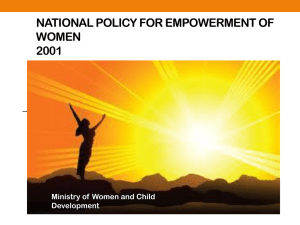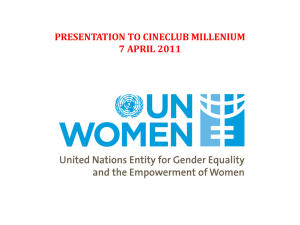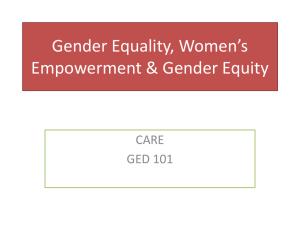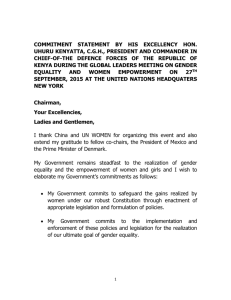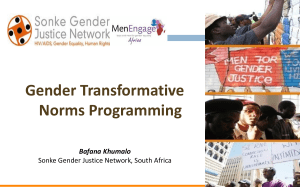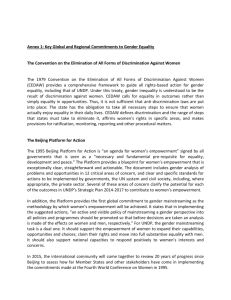New York University SCPS
advertisement
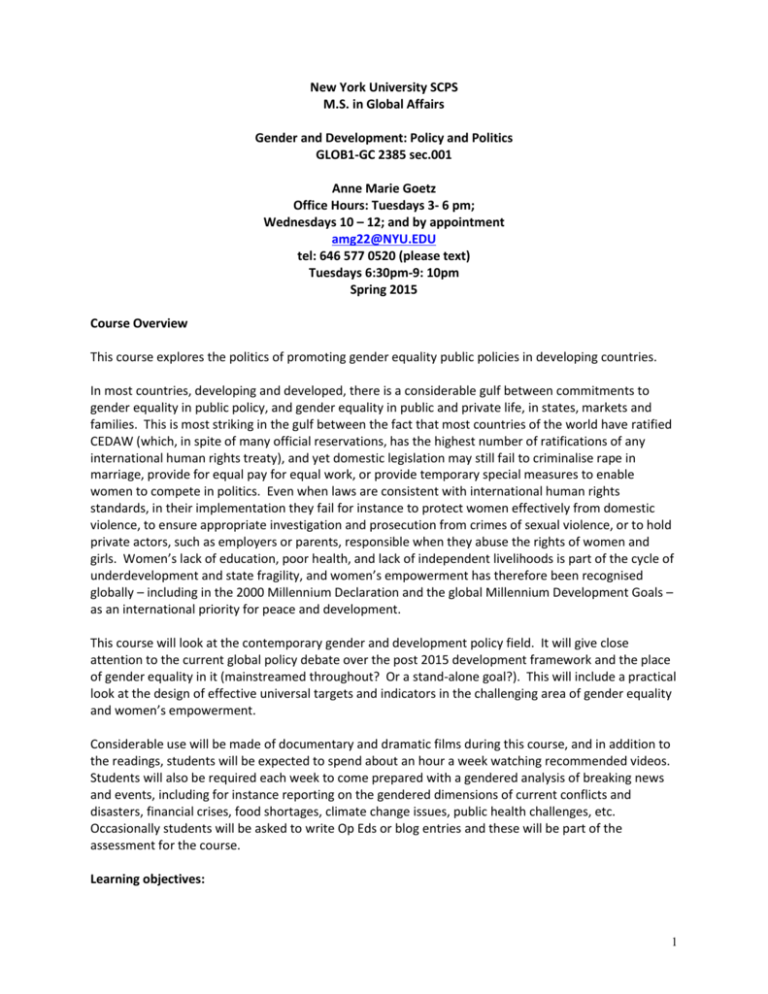
New York University SCPS M.S. in Global Affairs Gender and Development: Policy and Politics GLOB1-GC 2385 sec.001 Anne Marie Goetz Office Hours: Tuesdays 3- 6 pm; Wednesdays 10 – 12; and by appointment amg22@NYU.EDU tel: 646 577 0520 (please text) Tuesdays 6:30pm-9: 10pm Spring 2015 Course Overview This course explores the politics of promoting gender equality public policies in developing countries. In most countries, developing and developed, there is a considerable gulf between commitments to gender equality in public policy, and gender equality in public and private life, in states, markets and families. This is most striking in the gulf between the fact that most countries of the world have ratified CEDAW (which, in spite of many official reservations, has the highest number of ratifications of any international human rights treaty), and yet domestic legislation may still fail to criminalise rape in marriage, provide for equal pay for equal work, or provide temporary special measures to enable women to compete in politics. Even when laws are consistent with international human rights standards, in their implementation they fail for instance to protect women effectively from domestic violence, to ensure appropriate investigation and prosecution from crimes of sexual violence, or to hold private actors, such as employers or parents, responsible when they abuse the rights of women and girls. Women’s lack of education, poor health, and lack of independent livelihoods is part of the cycle of underdevelopment and state fragility, and women’s empowerment has therefore been recognised globally – including in the 2000 Millennium Declaration and the global Millennium Development Goals – as an international priority for peace and development. This course will look at the contemporary gender and development policy field. It will give close attention to the current global policy debate over the post 2015 development framework and the place of gender equality in it (mainstreamed throughout? Or a stand-alone goal?). This will include a practical look at the design of effective universal targets and indicators in the challenging area of gender equality and women’s empowerment. Considerable use will be made of documentary and dramatic films during this course, and in addition to the readings, students will be expected to spend about an hour a week watching recommended videos. Students will also be required each week to come prepared with a gendered analysis of breaking news and events, including for instance reporting on the gendered dimensions of current conflicts and disasters, financial crises, food shortages, climate change issues, public health challenges, etc. Occasionally students will be asked to write Op Eds or blog entries and these will be part of the assessment for the course. Learning objectives: 1 This course will provide a basic grounding in a very rich policy field. It will ensure that students have a basic understanding of the premises of ‘gender in development’ policies. It will review the core approaches to advancing gender equality in public and private life, entering into the long-standing ‘states versus markets’ debates in political economy. It will familiarise students with some current policy debates such as the review of the MDG framework and the preparation of a ‘post-2015’ development framework, the place of gender equality in the ‘aid effectiveness’ agenda, and the ‘women peace and security’ agenda. It will consider whether more women in public office make a difference to advancing gender equality policies, and will also examine the impact of ‘gender mainstreaming’ in international development and security institutions. CORE TEXTS: There is no required core text though you may find it useful to acquire the following as a good broad reference for the course: Nalini Visvanathan, Lynn Duggan, Nan Wiergersma and Laura Nisonoff, 2011, The Women, Gender and Development Reader, Zed Books, London. Price: $35.21 Shirin M. Rai and Georgina Waylen (eds), 2013, New Frontiers in Feminist Political Economy, Routledge. Price: $45.00 You can easily access analytical documents from international organisations with contents relevant to the course, for instance: Institute of Development Studies: 6 year project ‘Pathways to Women’s Empowerment’ – Voice, Bodily Integrity, and Work -- dozens of papers available on: http://www.ids.ac.uk/project/pathways-ofwomen-s-empowerment-research-programme-consortium World Bank. 2012. World Development Report: Gender Equality and Development, Washington: World Bank. http://econ.worldbank.org/WBSITE/EXTERNAL/EXTDEC/EXTRESEARCH/EXTWDRS/EXTWDR2012/0,,cont entMDK:23004468~pagePK:64167689~piPK:64167673~theSitePK:7778063,00.html UNIFEM, 2008, ‘Who Answers to Women? Gender and Accountability’, Progress of the World’s Women, New York The Oxfam Journal: Gender and Development http://www.genderanddevelopment.org/ Is a fantastic resource for the course and is available in the Bobst library. Minimum expected reading is indicated for each class, and additional recommended reading is supplied for further learning and to support term paper preparation. Individual students will be assigned at the beginning of the course responsibility for preparing a brief oral presentation on the key reading and another student will offer a critique (see below for more details). HIGHLY ACCESSIBLE/POPULAR TEXTS -- NOT REQUIRED, BUT RECOMMENDED: 2 Katherine Boo, 2012, Behind the Beautiful Forevers: Life Death and Hope in a Mumbai Undercity, Random House. $18.67 (currently also a play off Broadway) Nicolas Kristof and Sheryl WuDunn, 2009, Half the Sky: Turning Oppression into Opportunity for Women Worldwide, Alfred A Knopf, New York. $9.96 AT A GLANCE: Date 27 Jan 3 Feb Week 1 2 TOPIC Gender and Development – Introduction and Basic Concepts ‘Misbehaving’ policy; understanding gendered roles and defining empowerment 10 Feb 17 Feb 24 Feb 3 Mar 3 4 5 6 10 Mar 7 17 Mar 24 Mar 8 9 31 March 7 Apr 14 Apr 21 Apr 10 Globalization and the changing nature of gender roles in paid and unpaid work THE INTERNATIONAL FRAMEWORK ON WOMEN’S HUMAN RIGHTS VIOLENCE AGAINST WOMEN AS A GOVERNANCE AND DEVELOPMENT ISSUE WOMEN’S CIVIL SOCIETY MOBILIZATION TO PROMOTE WOMEN’S’ RIGHTS IN DEVELOPING COUNTRIES – ACHIEVEMENTS AND LIMITATIONS Side event off campus: A critical assessment of 20 years implementing the Beijing Platform for Action at the 59th meeting of the Commission on the Status of Women, United Nations Headquarters , midtown location NO CLASS POST 2015 SUSTAINABLE DEVELOPMENT GOALS: MEANINGFUL GOALS, TARGETS AND INDICATORS ON WOMEN’S STATUS AND RIGHTS Measuring Empowerment 28 Apr 5 May 14 15 11 12 13 HUMAN CAPITAL: EDUCATION PHYSICAL CAPITAL: EMPLOYMENT/MICRO-FINANCE/CASH TRANSFERS ECONOMIC REFORM, STRUCTURAL ADJUSTMENT AND THE NEW EFFICIENCY AGENDA GENDER MAINSTREAMING IN INTERNATIONAL ORGANIZATIONS Project design and monitoring Student Assessment The final grade is based on five components. Course Requirements and Grading: One ~800 word op-ed/speech/blog One book/article review (1000 words) Analytical paper (3 to 4000 words) Presentation Seminar Participation and Homework 15% 15% 30% 20% 20% March 13 April 17 May 8 1. Op-Ed/Speech/blog Please write an 800 word op-ed or speech of publishable quality on a current gender-related issue in 3 global affairs. The topic choice is yours – for instance women and nationalist or democracy movements (women in the Arab Spring!), violence against women in India/Brazil/South Africa and elsewhere, sexual violence in conflict, the investigation and/or prosecution of gender-related war crimes or crimes against humanity in international or hybrid tribunals persecution because of sexual orientation, women in the military, gender and development, race or class as it affects the experience of being gendered, indigenous women’s activism, gender equality policy debates in international organizations, gender in the post – 2015 Sustainable Development Goals, gender and climate change or planetary boundaries, etc. Please clear your topic with Professor Goetz by late February. Indicate in your heading your imagined/intended publication (NYT; Le Monde; Washington Post; Financial Times; BBC Global News; The Guardian; Huffington Post; Open Democracy; Institute for War And Peace; International Crisis Group; etc). Your Op Ed or speech should take issue with a policy position or should shine a new light on popular certainties and challenge them. It should not be descriptive. It should be provocative and indicate a graph of the issues in the area that you are addressing. ALTERNATIVE: You may write a 1000 word blog entry based on the visit to the event marking the 2015 59th Commission on the Status of Women. You may alternatively write a blog about any other relevant seminar or event that you attend that is relevant to this course. You must include a descriptions of the event and its substantive content, a comment on its relevance to gender and development policy, and critical observations about aspects of the event such as applications of the content or approaches to other issues, observations about the underlying politics determining the outcomes, etc. 2. Analytical Book/ Article Review Please submit a 1000 word critical book review or article review of a resource used for this course. You will have plenty of opportunity to practice. During the course you will engage in the author/critic presentation process twice (see below); once as critic; once as ‘author’. You may develop your written book review out of this exercise if you wish or you may write a review of any of the resources used for this course (if you wish to use something external to the course just please check beforehand with Prof. Goetz). You will be expected to ‘engage critically’ with the reading and either point out applications of the argument (for instance useful policy applications not anticipated by the author), limitations of the argument, or inconsistencies in the evidence or methodology. It is fine to be totally appreciative of the reading but you must add something to the reading experience in the form of observations about its utility or relevance. 3. Final Project: Analytical Paper For your final project you are asked to write an analytical paper to a maximum of 4000 words length (excluding bibliography, Annexes and footnotes/endnotes). Your paper should address an issue relevant to the course and should contain a clear expression of the problem or mystery or contradiction that you are investigating (for instance why is it that on the same day – October 28th 2014 -- that the UN Secretary-General recommitted to women’s participation in conflict resolution (as part of the annual commemoration of UN Security Council resolution 1325) he announced a high-level panel on reviewing UN peace operations that contained only 3 women out of 14 members? Or: Why is it that although women were at the frontline of the Arab Spring democracy protests their presence diminished substantially in the process of institutionalizing these democracy revolutions in Egypt or Tunisia? Or: Why has the Security Council been more interested in taking action to prevent sexual violence against women in conflict than in promoting women’s participation in peace talks or post-conflict elections? Or how can ISIS maintain its message of doctrinaire Islamist purity at the same time as justifying rape of non-Muslim minors and women?). Essay topics must be submitted to Prof Goetz by March 31; the final paper is due May 8. 3. Presentation Every student will give a SHORT 7 min BRIEFING plus 8 minutes for questions (time limit will be strictly enforced) on their analytic paper topic. This briefing must include a Power Point presentation (brevity 4 and innovation will be applauded and rewarded). 4. Seminar Attendance, Participation and Homework Class participation is a key element of our course and can take several forms: making informed comments, asking or responding to questions, and generally showing that you have thought about a topic or a case. During every class students will be asked to mention current events in the past week that are of relevance for the course and they are invited to post links to articles or your own commentary on the NYU Classes Forum page for the class. It is a good idea to read a major international newspaper daily (NYT, The Guardian, Le Monde or similar) and I expect everyone to listen to a global news podcast once a day (Al Jazeera and BBC offer excellent daily news summaries that you can listen to on your phone). IN ADDITION, there is a weekly ‘author/critic’ debate in which students will prepare and present summaries of a key reading and a critique of that reading. Each week a different pair of students will take this role, one as author, one as critic. Every student in the class will have a role once as the author and once as the critic. During the second class there will be a ‘trial run’ of this process. • Roles/Process: One student will be the author, and give a five to ten minute summary of her/his article/chapter/report (doing his/her best to “sell” the document’s key arguments). The other student is the (friendly, collegial, but still incisive) critic, and gets five minutes to critique some portion of the author’s work. The author then gets several minutes to rebut the charges. The rest of the class, which should have been taking notes (and will have read the article/chapter anyway), will then join in the debate on the merits of the reading(s) under discussion. • Partnership: The nature of the assignment requires the two students to coordinate in advance. Begin communicating with your presentation collaborator as soon as possible. Get email addresses from one another in class. An important planning consideration is that the author cannot develop a rebuttal until s/he discusses the critique with the critic. SCPS Statement on Academic Integrity and Plagiarism “Plagiarism is presenting someone else’s work as though it were one’s own. More specifically, plagiarism is to present as one’s own a sequence of words quoted without quotation marks from another writer; a paraphrased passage from another writer’s work; creative images, artwork, or design; or facts or ideas gathered, organized, and reported by someone else, orally and/or in writing and not providing proper attribution. Since plagiarism is a matter of fact, not of the student’s intention, it is crucial that acknowledgement of the sources be accurate and complete. Even where there is no conscious intention to deceive, the failure to make appropriate acknowledgment constitutes plagiarism. Penalties for plagiarism range from failure for a paper or course to dismissal from the University.” NYU Classes All written work must be submitted via the Assignment Tool on NYU Classes to be scanned through Turnitin. CGA Attendance and Lateness Policy All students must attend class regularly. Your contribution to classroom learning is essential to the success of the course. Any more than two (2) absences (with an explanation or not) will likely lead to a 5 need to withdraw from the course or a failing grade. Incomplete Policy Incompletes are only granted in extreme cases such as illness or other family emergency and only where almost all work for the semester has been successfully completed. A student’s procrastination in completing his/her paper is not a basis for an Incomplete. SCPS Grading Scale Grade A AB+ B BC+ C CF Meaning Exceptional; superior effort Excellent Very good Good; meets program standards Meets program standards in most respects Requires moderate improvement Requires significant improvement Requires extensive improvement Fail – Did not meet minimal course requirements GPA Conversion 4.0 3.7 3.3 3.0 2.7 2.3 2.0 1.7 0 WEEK 1: January 27 2015: GENDER AND DEVELOPMENT: Introduction What is the Gender and Development ‘problem’? Why are women’s economic rights, social freedoms, and access to justice persistently weaker than men’s, even within the same racial/socioeconomic category, even in the very same family? Why is this a problem for development, justice, even peace and environmental sustainability? Required: WDR 2012, Section 2: ‘The Persistence of Gender Inequality’, pages 72-88. Short video: The Girl Effect For the author-critic practice: Esther Duflo, 2013, ‘Women’s Empowerment and Economic Development’, Journal of Economic Development, 50:4, 1051-1979 -- on http://economics.mit.edu/files/7417 And Kabeer’s critique of Duflo: http://feministeconomicsposts.iaffe.org/2013/12/19/esther-duflo-onwomens-empowerment-and-economic-development-a-must-read-for-feminist-economists/ Recommended: 6 Kristof and Wu Dunn, Chapters 6, 7, or 10 World Bank 2012 WDR, ‘Section I: Taking Stock’. WEEK 2: February 3 2015 ‘Misbehaving’ policy; understanding gendered roles and defining empowerment Why have gender and development projects tended to get things wrong so often? Why do they remain so marginal to ‘mainstream’ development approaches? Overview of the history and consequences of women’s exclusion from development processes and externally-funded economic and political development programmes. Required: Caroline O. Moser, 1991, ‘Gender Planning in the Third World: Meeting Practical and Strategic Needs’, in Rebecca Grant and Kathleen Newland (eds), Gender and International Relations, University of Indiana press, Bloomington. NYU Classes Resources page Anne Marie Goetz, 1991, ‘Fishy Business: Misunderstanding Gender and Social relations in a Fish Smoking project in Guinea’ – unpublished mimeo. NYU Classes Resources page For the author-critic exercise: Deniz Kandiyoti, 1988, ‘Bargaining with Patriarchy’, Gender and Society, Vol. 2, No. 3, pp. 274-290 Jose Olavarria, 2006, “Men’s Gender Relations, Identity, and Work-Family Balance in Latin America,” in Ian Bannon and Maria C. Correia, eds., The Other Half of Gender: Men's Issues in Development, World Bank, pp. 29-42. Mary Amuyunzu-Nyamongo and Paul Francis, 2006, “Collapsing Livelihoods and the Crisis of Masculinity in Rural Kenya,” in Bannon and Correia, pp.219-244. Andrea Cornwall and Nana Skua Anyidoho, 2010, ‘Women’s Empowerment: Contentions and Contestations, Development, Vol. 53 no. 2, 144 – 149. WEEK 3: February 10, 2015 Globalization and the changing nature of gender roles in paid and unpaid work How has the globalization of production and trade affected gendered roles and relationships? What is the ‘care economy’ and how does the gender division of care labour affect women’s empowerment? Required reading: 7 Shirin Rai and Georgina Waylen, 2013, ‘Feminist Political Economy: Looking Back, Looking Forward’, in New Frontiers in Feminist Political Economy, (eds) Shirin Rai and Georgina Waylen, Routledge For the author-critic debate: Naila Kabeer, 2013, ‘The Rise of the Female Breadwinner: Reconfigurations of Marriage, Motherhood, and Masculinity in the Global Economy’, in New Frontiers in Feminist Political Economy, (eds) Shirin Rai and Georgina Waylen, Routledge. Kate Doyle, Jane Kato-Wallace, Shamsi Kazimbaya and Gary Barker , 2014, ‘Transforming gender roles in domestic and caregiving work: preliminary findings from engaging fathers in maternal, newborn and child health in Rwanda’ in Gender and Development, Vol. 22. Issue 3 http://www.genderanddevelopment.org/page/current-issue#sthash.k6nYVOCv.dpuf Recommended: World Bank, 2012, ‘Globalization’s impact on gender equality: What’s happened and what’s needed’ in the World Development Report, link: http://siteresources.worldbank.org/INTWDR2012/Resources/7778105-1299699968583/77862101315936222006/chapter-6.pdf David L. Richards and Ronald Gelleny, “Women’s Status and Economic Globalization,” International Studies Quarterly 51 (2007), pp.855–876. WEEK 4: February 17 THE INTERNATIONAL FRAMEWORK ON WOMEN’S HUMAN RIGHTS This session will introduce the international regime on women’s human rights and will explore how women have used international norms – such as the CEDAW treaty of the 1995 Beijing Platform for Action in domestic contexts. ‘Culture’ is regularly invoked by national governments to explain the nonapplicability of intentional standards – this can be seen in the high rate of specific reservations made by a number of countries before they ratified CEDAW. But who determines the meaning of ‘culture’ and why is women’s deportment, dress, and mobility so often identified as the key marker of culture? This session will also explore the critique from women’s rights activists from the Global South of western feminist scripts on women’s empowerment and gender and development. Video: Neria Required: Review the website on the Beijing Platform for Action and read portions of the Platform itself of interest to you: United Nations 1995, Beijing Platform for Action http://www.un.org/womenwatch/daw/beijing/platform/plat1.htm AND: Review the CEDAW website http://www.ohchr.org/EN/HRBodies/CEDAW/Pages/CEDAWIndex.aspx 8 And focus on country situations or issues of interest to you. Please read the treaty itself – it is not long. For the author/critic debates: Mohanty, Chandra Talpade. “Under Western Eyes: Feminist Scholarship and Colonial Discourses.” Feminism without Borders: Decolonizing Theory, Practicing Solidarity. Durham, NC: Duke UP, 2003. 1742. Cheshmak Farhoumand-Sims, 2009, ‘CEDAW and Afghanistan’, Journal of International Women's Studies, Volume 11 Issue 1 Gender and Islam in Asia, Cheshmak Farhoumand-Sims Recommended: Inter-Parliamentary Union and United Nations, 2003, The Convention on the Elimination of all Forms of Discrimination against Women and its Optional Protocol: Handbook for Parliamentarians, http://www.ipu.org/PDF/publications/cedaw_en.pdf Sally Engle Merry, 2006, Human Rights and Gender Violence: Translating International Law into Local Justice, University of Chicago Press. (Introductory chapter) A Handbook on CEDAW – The UN Convention on the Elimination of All Forms of Discrimination against Women ( Katarina Tomasevski, SIDA 1999) [p. 7-36] Week 5: February 24 VIOLENCE AGAINST WOMEN AS A GOVERNANCE AND DEVELOPMENT ISSUE On December 16th 2012 a 23 year old medical student was gang raped on a private bus in the early evening in Delhi on her way home from a film with a male friend. Both were beaten brutally and left by the roadside. The women died two weeks later. The subsequent protest brought women and men onto the streets across the country, protesting police complicity with serious human rights abuses of women, judicial diffidence in prosecutions of gender-based crimes, and state failure to protect women. Violence against women was redefined as a governance problem and linked to corruption and inequality – major national concerns -- to an extent not ever seen before either in India or most other countries. This incident represents an unusual moment in the politics of translating culturally tolerated or excused abuses of women’s rights into a national concern. It has triggered a change in party politics and the repercussions are being felt today in the unprecedented rise of a tiny anti-corruption party in Delhi that is running for national elections this month. We will examine the conditions under which effective public action against gender-based violence takes place. Video: Browse the collection of videos on UN Women’s you tube site for the ‘UNITE’ Campaign against violence against women: http://www.youtube.com/watch?v=fL5N8rSy4CU&list=PL4ABo9CdOrDfNiAx6X8EIrmi2lF2jfXMZ Required reading: 9 Oxfam, 2014, ‘Close the Gap: How to eliminate violence against women beyond 2015’, Policy briefing, http://policy-practice.oxfam.org.uk/publications/close-the-gap-how-to-eliminate-violence-againstwomen-beyond-2015-313828 Naila Kabeer, 2013: ‘Grief and rage in India: making violence against women history? , Open Democracy: http://www.opendemocracy.net/5050/naila-kabeer/grief-and-rage-in-india-making-violence-againstwomen-history For the author/critic debate: Mala Htun and S. Laurel Weldon, 2012, ‘The Civic Origins of Progressive Policy Change: Combating Violence against Women in Global Perspective, 1975 – 2005’, American Political Science Review, 106:3, 548-569. http://journals.cambridge.org/abstract_S0003055412000226 Recommended: S. Laurel Weldon, 2002, Protest, Policy and the Problem of Violence against Women, University of Pittsburgh Press, Part I UNIFEM: Violence Against Women: Facts and Fiction http://www.unifem.org/attachments/gender_issues/violence_against_women/facts_figures_violence_a gainst_women_20060126.pdf Kristof, Is Delhi so Different from Steubenville? http://www.nytimes.com/2013/01/13/opinion/sunday/is-delhi-so-different-fromsteubenville.html?gwh=A7E29EB0422CF3DA815DC25C3925B21B You can read about other landmark cases that triggered legislative, policy and practical reforms for instance the Maria de la Penha case and law in Brazil (http://progress.unwomen.org/landmark-courtcases/), the less successful Bhanwari Devi case in Rajasthan (http://www.youtube.com/watch?v=HWTiHyOAJYQ), and potential changes to domestic relations and criminal law in Kenya on the basis of a group case of rapes of young girls: http://www.cbc.ca/strombo/news/girls-win-landmark-decision-against-police-in-kenya-rape-case.html. WEEK 6: March 3 2015 WOMEN’S CIVIL SOCIETY MOBILIZATION TO PROMOTE WOMEN’S’ RIGHTS IN DEVELOPING COUNTRIES – ACHIEVEMENTS AND LIMITATIONS Cuz I have had something to prove as long as I know there’s something that needs improvement, and you know that every time I move I make a woman’s movement. 10 Ani DiFranco, ‘Hour Follows Hour’ (1995). How effectively do women’s organisations represent women’s needs and interests, and how effectively do they promote them in politics? What are the obstacles to the effective mobilisation of women in civil society? What patterns of relations typically exist between women’s organisations and the state? Required Reading: Naila Kabeer and Lopita Huq, 2010, ‘The Power of Relationships: Love and Solidarity in a Landless Women’s Organization in Rural Bangladesh’, in IDS Bulletin, March 1, Brighton. For the author/critic debate: Tripp, Ailli. "Women's Movements, Customary Law, and Land Rights in Africa : The Case of Uganda ." African Studies Quarterly 7, no.4 Recommended: Chapters from: Aili Mari Tripp, Isabel Casimiro, Joy Kwesiga, Alice Mungwa, 2009, African Women’s Movement: Changing Political Landscapes, Cambridge University Press. Amrita Basu, (ed) 2010, Women’s Movements in The Global Era: The Power of Local Feminisms, Westview. Molyneux, Maxine, 2001, ‘Analysing Women’s Movements’, in Women’s Movements in International Perspective: Latin America and Beyond, Palgrave, London. S. Laurel Weldon, 2002, Protest, Policy and the Problem of Violence against Women, University of Pittsburgh Press, Chapter 6 WEEK 7: MARCH 10: OFF-CAMPUS FIELD TRIP: UNITED NATIONS 59TH COMMISSION ON THE STATUS OF WOMEN: Beijing plus 20 review For background please see: http://www.unwomen.org/en/csw/csw59-2015 Your short written assignment (Op Ed, speech, blog etc.) Is due on March 13th, end of this week. You could base it on your CSW experience or anything in the course so far. WEEK 8: MARCH 17 – NO CLASS WEEK 9: MARCH 24 11 POST 2015 SUSTAINABLE DEVELOPMENT GOALS: MEANINGFUL GOALS, TARGETS AND INDICATORS ON WOMEN’S STATUS AND RIGHTS As a set of time-bound targets, the MDGs have played a critical role in mobilizing integrated international action on global poverty issues. They are now giving way to the ‘Post 2015’ ‘Sustainable Development Goals’. The assessment of the MDGs reveals a mixed picture that points to success in some areas (including reducing extreme poverty, improving access to education and access to safe drinking water), but less progress in others (e.g. reducing hunger, maternal mortality, improving access to sanitation), and regression in important areas that were omitted from the goals, targets and indicators (e.g. inequality, environmental sustainability, respect for planetary boundaries). In this session we look at how the MDGs helped advance some aspects of gender equality, and we assess the proposals for the new gender goal (Goal 5) in the ‘Sustainable Development Goals’. The MDGs targets and indicators often fixated on narrow – or statistically expedient – measures of human development. A clear example of this is the focus of the MDG3 target on gender parity in education, at the expense of major gender-specific injustices such as unequal wages, women’s unpaid work burden, violence against women, extremely limited control over assets and property, and unequal participation in public decision-making. Without attention to these issues, the gender-based differences in power and resources that block the realisation of women’s rights are rendered invisible. The structural causes of discrimination and harm on the grounds of gender are left unchanged. Required reading: UN Women, 2013, A Transformative Stand-Alone Goal on Achieving Gender Equality, Women’s Rights and Women’s Empowerment’, New York, http://www.unwomen.org/~/media/headquarters/attachments/sections/library/publications/2013/10/ unwomen_post2015_positionpaper_english_final_web%20pdf.pdf Please also skim the UN Website on the Sustainable Development Goals: http://sustainabledevelopment.un.org/post2015 And the response from the ‘Women’s Major Group’ to the SG’s report on the SDGs: https://docs.google.com/a/nyu.edu/document/d/1zcUSe4ZZaj1bYYyO50UolHvJyRyS72buI4FWGihLMmY /edit Reading for the author/critic debate: Naila Kabeer, 2013, ‘Rights, capabilities and collective action: the ‘missing ingredient’ in the MDGs’, expert paper, UN Women, Mexico City, http://www.unwomen.org/~/media/headquarters/attachments/sections/csw/58/ep13nailakabeer%20pdf.pdf Recommended: AWID, 2013, ‘Have the Millennium Development Goals promoted gender equality and women’s rights?’, mimeo, paper delivered to the UN Women Expert Group Meeting: ‘Structural and policy constraints in achieving the MDGs for women and girls’, Mexico City, Mexico, 21-24 October 2013, http://www.unwomen.org/~/media/Headquarters/Attachments/Sections/CSW/58/EP12AWID%20pdf.pdf 12 Naila Kabeer, 1999, ‘Resources, Agency, Achievements: Reflections on Measuring Women’s Empowerment’ in Development and Change Vol. 30. Jayati Ghosh, 2009, ‘Background paper’, Expert Group Meeting on ‘The Impact of the Implementation of the Beijing Declaration and Platform for Action on the Achievement of the Millennium Development Goals’, Division for the Advancement of Women, United Nations. http://www.un.org/womenwatch/daw/egm/impact_bdpfa/informational/EGM-BPFA-MDG-2009BP1.pdf Or select from among the wide range of background papers assembled for the October 2013 Mexico City UN Women Expert Group meeting on the MDGs: http://www.unwomen.org/en/csw/csw582014/preparations/expert-group-meeting Grown, C. 2005. “Answering the Skeptics: Achieving gender equality and the Millennium Development Goals.” Development, 48 (3): 82-85. WEEK 10: MARCH 31 Measuring Empowerment Guest lecturer: Sara Duerto, UN Women Are there universally relevant measures of women’s empowerment? What constitutes a good indicator of gender equality? What can be done about measuring crucial elements of women’s empowerment that are poorly or not at all captured in national statistics, such as the gender share of unpaid care work, or levels of domestic violence? Why were the existing gender indicators in the MDG framework selected and what are their merits and shortcomings? In the emerging post-2015 framework, what are the gender indicators proposed so far both in the possible standalone goal on gender equality and in other areas of the framework? In this session, with Guest Lecturer Sara Duerto of UN Women, we will learn about how to design ‘SMART’ indicators on women’s empowerment and gender equality. Readings: Outcome document of the discussions of the Open Working Group http://www.worldwewant2015.org/node/449888 Synthesis report of the Secretary General http://www.un.org/disabilities/documents/reports/SG_Synthesis_Report_Road_to_Dignity_by_2030 .pdf UN System Task Team on the Post-2015 Development Agenda: ‘Statistics and Indicators for the post2015 Development Agenda’ , http://www.un.org/en/development/desa/policy/untaskteam_undf/UNTT_MonitoringReport_WEB.pdf and on NYU Classes resource page Recommended: 13 United Nations, 2014, Secretary-General’s Report to the 45th session of the Statistical Commission, ‘Report of the Chair on Broader Measures of Progress’ New York, http://unstats.un.org/unsd/statcom/doc14/2014-4-BroaderMeasures-E.pd, and on course site No author-critic reading this week WEEK 11: APRIL 7 HUMAN CAPITAL: EDUCATION Girls’ education is the key to resolving a wide range of social ills – as long as it is supported by other conditions such as freedom of speech and assembly for women’s organisations, and opportunities for employment. Required: Barbara Herz and Gene B Sperling,2004, What Works in Girls Education: Evidence and Policies from the Developing World, Council on Foreign Relations (NYU Classes) - read as much of this as you can, but do focus on areas of specific interests such as the case studies or the impact on reproductive health or the impact on future income. For author-critic debate: Akosuah Darkwah, 2010, ‘Education: Pathway to Empowerment for Ghanaian Women?’, IDS Bulletin, March 1 http://ezproxy.library.nyu.edu:15490/ehost/pdfviewer/pdfviewer?vid=2&sid=58d05238-7329-499c98fc-cdfa47660717%40sessionmgr111&hid=123 Recommended: This is hugely dated and at times politically incorrect, but it was the book that started the whole gender and development field and in particular the focus on girls’ education. It is a classic: Esther Boserup, 1970, Women’s Role in Economic Development, chapters 7 (The Educated Woman) and 12 (The Design of Female Education), George Allen and Unwin Ltd, London., NYU Classes resource page You should look at back copies of UNESCO’s annual report on education for all; all of them have a strong focus on gender issues. See especially the volume for 2003/4: http://www.unesco.org/new/en/education/themes/leading-the-internationalagenda/efareport/reports/ Elaine Unterhalter, 2013, ‘The MDGs, girls’ education and gender equality’, UN Women, Mexico City, http://www.unwomen.org/~/media/headquarters/attachments/sections/csw/58/ep4-elaineunterhalter%20pdf.pdf Sivananthi Thanenthiran, 2013, ‘Have the MDGs fostered progress on women’s SRHR? Effective policies and remaining challenges’ Expert paper, UN Women, Mexico City, http://www.unwomen.org/~/media/headquarters/attachments/sections/csw/58/ep9sivananthithanenthiran%20pdf.pdf Sebastian Edwards, 2014 Is Education Improved by Making it a Legal Right? World Economic Forum, https://agenda.weforum.org/2015/01/is-education-improved-by-making-it-a-legalright/?utm_content=bufferc41be&utm_medium=social&utm_source=twitter.com&utm_campaign=buff er 14 WEEK 12: APRIL 14 PHYSICAL CAPITAL: EMPLOYMENT/MICRO-FINANCE/CASH TRANSFERS Required: Naila Kabeer et al, 2013, ‘Paid work, women’s empowerment and inclusive growth: Transforming the structures of constraint’, part of the Pathways to Women’s Empowerment project, IDS Sussex. http://www.unwomen.org/~/media/headquarters/attachments/sections/library/publications/2013/1/p aid-work-womens-empowerment-and-inclusive-growth2%20pdf.pdf Anne Marie Goetz and Rina Sen Gupta,1996, 'Who Takes the Credit? Gender and Power in Rural Credit Programs in Bangladesh', World Development, Vol. 27, No. 1, January. NYU Classes resource Page Maxine Molyneux and Marilyn Thomspon, ‘Do Conditional Cash Transfers really Empower Women? A look at CCTs in Peru, Ecuador and Bolivia’, CARE Learning and Policy Series, Issue 2, http://insights.careinternational.org.uk/media/k2/attachments/6524_CCT-Briefing_final.pdf For the author-critic debate: Alexandra Bernasek, “Banking on Social Change: Grameen Bank Lending to Women” International Journal of Politics, Culture and Society, 16, 3 (2003), pp. 369-385. ISABELLE GUE´RIN, SANTHOSH KUMAR & ISABELLE AGIER, 2013, ‘Women’s Empowerment: Power to Act or Power over Other Women? Lessons from Indian Microfinance’, Oxford Development Studies, 2013 Recommended: Naila Kabeer 2011.’ Contextualising the Economic Pathways of Women’s Empowerment Findings from a Multi-Country Research Programme’. Pathways Policy Paper WEEK 13: APRIL 21 ECONOMIC REFORM, STRUCTURAL ADJUSTMENT AND THE NEW EFFICIENCY AGENDA Required: Sylvia Chant and Caroline Sweetman, 2012, ‘Fixing women or fixing the world? ‘Smart Economics’, efficiency approaches, and gender equality in development’, in Gender and Development, Oxfam, Vol. 20 No. 3. For the author-critic debate: 15 Rahel Kunz, 2011, “The ‘Making Women Productive’ Strategy,” in Marianne H. Marchand and Anne Sisson Runyan, eds., Gender and Global Restructuring : Sightings, Sites, and Resistances, 2nd ed. Routledge, New York, pp.163-180. WEEK 14: APRIL 28 GENDER MAINSTREAMING IN INTERNATIONAL ORGANIZATIONS Grand commitments to gender equality in international organisations like the World Bank and the UN are rarely matched by financial and human resource commitments. For the insider ‘femocrats’ challenges remain intense as they have to struggle to raise gender issues in every new policy development. The creation of UN Women (United Nations Entity for gender Equality and Women’s Empowerment) in mid-2010 was designed precisely to combat the marginalisation and trivialization and dilution of the gender equality agenda that accompanies gender mainstreaming in international organisations. Has UN Women achieved this goal? Required reading: Hilary Charlesworth and Christine Chinkin, 2013, ‘The Creation of UN Women’, Australian National University, REGNET Research Paper, No 2013/7. Jane Parpart, 1995, ‘Deconstructing the Development ‘Expert’: Gender, Development and the ‘vulnerable groups’. In Feminism, Postmodernism Development, Marianne Marchand and Jane Parpart (eds), Routledge, London. NYU Classes resources page For the author-critic debate: John McMahon (CUNY Graduate center), 2013, ‘Depoliticization, Essentialization, or Transformation? UN Women’s Representations of Men and Masculinity’, Prepared for (and winner of best graduate student paper 2013 in) International Studies Association Annual Convention, San Francisco. Recommended: Torild Skard, 2008, ‘Getting our History Right: How were the equal rights of women and men included in the Charter of the United Nations?’ Forum for Development Studies, no. 1, 37-60. Goetz, Anne Marie, 2000, ‘Lobbying for Economic Justice: Women’s Movements and the World Bank’, in Robert O’Brien (ed), Contesting Global Governance: Multilateral Economic Institutions and Global Social Movements, Cambridge University Press, Cambridge. NYU Classes Resource page A.M. Goetz and Sally Baden, ‘Who Needs [Sex] when you can have [Gender]? Conflicting Discourses on Gender at Beijing’, in Kathleen Staudt (ed.), 1997, Women, International Development, and Politics: The Bureaucratic Mire, Philadelphia: Temple University Press, 2nd Edition. NYU Classes Resource Page. WEEK 15: May 5 16 Project design and monitoring Guest lecturer: S.K. Guha We end the course with a workshop led by a senior development practitioner, S.K. Guha, on the nuts and bolts of project design and monitoring using the ‘resists-based management’ system. You will learn about logical frameworks, differences between goals, outputs and activities, and methods for designing indicators that can generate data for monitoring progress. Your term paper is due at the end of this week, May 8. Instructor Dr. Anne Marie Goetz, who joined CGA in January 2014, previously served at the United Nations since 2005 as Chief Advisor on Governance, Peace and Security, for UNIFEM and then UN Women. Prior to joining UNIFEM in 2005, she was a Professor of Political Science at the Institute of Development Studies, University of Sussex where she worked since 1991. She also served the United Nations Development Programme in Chad and Guinea in the mid-1980s. While at the UN over the past decade Dr. Goetz spearheaded initiatives to promote women’s empowerment in the UN’s peace building work in postconflict situations, to build peacekeepers’ capacities to detect and prevent sexual violence in conflict, and to support women’s organizations’ efforts to participate in peace talks and post-conflict decisionmaking. Dr. Goetz is a political scientist who specializes in research on development policies in fragile states to promote the interests of marginalized social groups, particularly poor women. She also researches conditions for democratization and good governance in South Asia and East Africa. This has included research on pro-poor and gender-sensitive approaches to public sector reforms, anti-corruption initiatives, decentralization, and state building in fragile states and post-conflict situations. Professor Goetz is the author of eight books on the subjects of gender, politics and policy in developing countries, and on accountability reforms - the latest is a 2009 edited volume: Governing Women: Women in Politics and Governance in Developing Countries (Routlegde). 17
